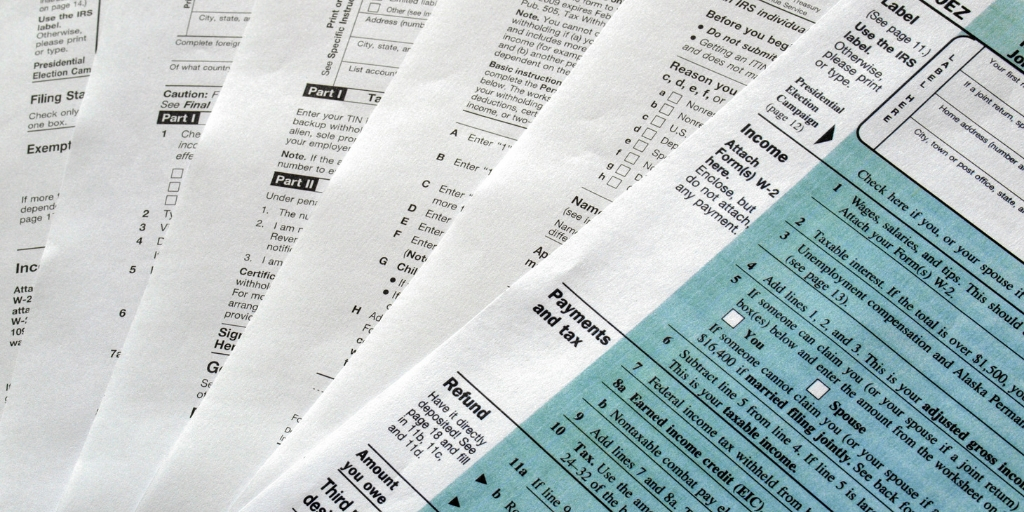By Frank Legan, Co-Author Dayna Smith
Tax season can be stressful and frustrating even in the best of times; factor in two years full of uncertainty and it’s understandable if you want to stick your head in the sand and avoid it. We’re here to help! Here’s the trick: the better prepared you are, the sooner you can shake off that stress and forget about tax filing until next year. We’ve created a tax-preparation checklist to help you do just that!
Organize Your Personal & Income Information
You’ll start receiving various tax documents virtually or in the mail soon, so instead of letting them sit in a pile on your counter, create an organized system for the following.
Income Information
- Form W-2: These are issued by employers and show your wages and tax withholdings. They are supposed to be mailed by January 31.
- Form 1099-MISC: These report income you have received as an independent contractor or freelancer. You should receive one from each person or company that pays you.
- Form 1099-INT: This form will show any interest you have earned.
- Form 1099-R: This form reports income received from annuities, IRAs, or pensions.
- Form 1099-DIV: Any dividend income you earn is reported on this form.
- Form 1099-B or 1099-S: You will receive these if you have any income from the sale of property or stock.
- Form 1098: You will get this from your mortgage company reporting the interest that you paid.
- Form 1098-T: This reports payments of qualified tuition and expenses.
- Form 1095-A or 1095-C: These forms report your healthcare coverage for the year and your premium tax credit, if applicable.
- Schedule K-1 (Form 1065, Form 1120S, or Form 1041): This reports income for a partner, a shareholder, or an income beneficiary of an estate or trust. The Schedule K-1 normal deadline can be as late as April 15th.
- Notice 1444-C or Letter 6475 for the third round of stimulus payments in 2021 (more on this below).
- Letter 6419 for the advanced child tax credit (ACTC) payments you received (more on this below).
Income-Reduction Documents
- Form 1098-E for student loan interest paid, or loan statements for student loans received
- Form 1098-T for tuition paid or receipts from the institution you or your dependents attend
- Receipts for any qualifying energy-efficient home improvements
- Records of IRA contributions made during the year
- SEP, SIMPLE, and other self-employed pension plan information
- Records of medical savings account (MSA) contributions
- Moving expense records
- Self-employed health insurance payment records
- Alimony you paid
Personal Information
If you want your tax-filing experience to be painless, you’ll also want to make sure that you have all of your and your dependents’ personal information available, such as:
- Social Security numbers and birth dates
- Copies of last year’s tax return (helpful, but not required)
- Bank account number and routing number, if you wish to have your refund deposited directly into your account
Gather Documents for Itemization
If you’re planning to itemize your deductions this year, you’ll need records to include your totals and provide proof.
Deductions and Credits
- Childcare costs: provider’s name, address, tax ID, and the amount paid
- Education costs: Form 1098-T, education expenses
- Adoption costs: SSN of the child; records of legal, medical, and transportation costs
- Form 1098: Mortgage interest, private mortgage insurance (PMI), and points you paid
- Investment interest expenses
- Charitable donations: cash amounts and official charity receipts
- Medical and dental expenses paid
- Casualty and theft losses: the amount of damage, insurance reimbursements
- Records/amounts of other miscellaneous tax deductions: union dues; unreimbursed employee expenses (uniforms, supplies, seminars, continuing education, publications, travel, etc.)
- Records of home business expenses
Taxes Paid
- State and local income tax
- Real estate tax
- Personal property tax
New Documents for 2021
In 2021, many people received the third round of Economic Impact Payments (EIP3). In addition, the government launched the Advanced Child Tax Credit (ACTC) payment program. Because of these changes, you must have these new documents when filing your 2021 taxes:
- Notice 1444-C (sent following the stimulus payment) or Letter 6475 (issued in January 2022).
- Letter 6419 (issued by the IRS in January 2022)
If you don’t have these documents, you can log in to your IRS.gov account to find them.
Stay on Top of Tax Changes
Those lists cover the details of what you’ll need in front of you to thoroughly fill out your tax return. But there are also a few things to think about that could impact how you file, such as any changes that have occurred this year. Did you add another child to your family? Did one of your children start college? Did you start taking withdrawals from a retirement account? All these changes need to be reflected on your tax return but won’t show up on prior returns.
More than personal changes, there may be changes to federal or state tax law that you should be aware of for the future. While the fate of the Build Back Better Act is still unsure, the proposed tax changes could have major implications for your financial situation, such as the phasing out of backdoor Roths, new surcharges on high-income earners, and changes to taxes for businesses. (!)
Specifically, you should stay on top of annual changes to retirement plan contribution limits. For the 2021 tax year, you can put up to $6,000 in any type of IRA. If you are over age 50, that amount goes up to $7,000 thanks to the $1,000 catch-up contribution. Annual contribution limits for 401(k)s, 403(b)s, and most 457 plans are $19,500. If you are 50 or older, your yearly contribution limit goes up to $26,000. And if you are eligible to contribute to an HSA, you can save $3,600 if you have single medical coverage and $7,200 if you are covered under a qualifying family plan. If you are 55 or older, those limits go up another $1,000. Keep in mind that for IRAs and HSAs, you have until April 15th, 2022, to contribute for the 2021 tax year.
A knowledgeable financial professional can help you understand any tax law changes and how they affect you.
Look Ahead to the Future
Despite how overwhelming things are right now, it’s important to get your 2021 tax return filed properly and accurately. It is just as important to look at the bigger picture of taxes in general, and to make sure you’re optimizing all the tools available to you to limit your tax liability.
Taxes are complicated, to put it lightly, so it helps to work with a professional who understands them if you want to maximize the opportunities available. And an experienced financial professional can also help you with tax planning in light of your overall goals and financial plan.
If you want to be proactive about tax planning and you don’t have a trusted advisor yet, we at Cedar Brook Group would love to help you experience confidence in every aspect of your financial plan. Set up an appointment today by reaching out to us at 440-683-9213 or flegan@cedarbrookfinancial.com or scheduling a complimentary introductory call online!
About Frank
Frank Legan is Partner, Financial Advisor, and member of the Forward Look Committee at Cedar Brook Group, one of the largest independent wealth management firms in Northeast Ohio. Frank spends his days designing and implementing personalized financial planning strategies for corporate executives, closely held business owners, artists, families, and retirees. He specializes in lifetime income strategies, investment advice, and estate planning services. He also works with businesses to develop strategic and succession planning strategies. Frank has a Bachelor of Arts in Political Science from the University of Dayton, as well as a Master of Public Administration focused on municipal management from Cleveland State University. Prior to joining Cedar Brook Group, Frank was a financial advisor in the private client group at Merrill Lynch and with NatCity/PNC Investments. Frank is active in his community, serving on various councils, boards, and committees. Frank serves as Chairman of the Board of Directors for Catholic Charities Diocese of Cleveland, and is a board member of the Catholic Community Foundation. When he’s not working, you can find Frank spending time with his wife, Laura, their daughter, Reese, and their beloved collie, Charlie. Frank and his family are volunteers at St. Francis of Assisi church in Gates Mills. To learn more about Frank, connect with him on LinkedIn.
Securities offered through Cadaret, Grant & Co., Inc., an SEC Registered Investment Advisor and member FINRA/SIPC. Advisory services offered through Cadaret, Grant & Co., Inc. and Cedar Brook Group, an SEC Registered Investment Advisor. Cadaret, Grant & Co. and Cedar Brook are separate entities. Please remember that securities cannot be purchased, sold or traded via e-mail or voice message system. Please contact our office at 440.683.9213 should you need assistance in placing a trade. This email transmission and any documents, files or previous email messages attached to it may contain information that is confidential or legally privileged. If you are not the intended recipient, you are hereby notified that you must not read this transmission and that any disclosure, copying, printing, distribution, or any action or omission of this transmission is strictly prohibited. If you have received this transmission in error, please immediately notify the sender by telephone at 440.683.9213 or return and delete the original transmission and its attachments without reading or saving in any manner.
____________
(1) https://taxfoundation.org/build-back-better-plan-reconciliation-bill-tax/







